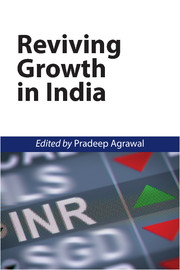Book contents
- Frontmatter
- Contents
- List of Tables and Figures
- Preface
- Section 1 The importance of growth
- Section 2 Reviving growth of industry and exports
- Section 3 The dampeners to growth: Controlling inflation
- Section 4 The supply constraints to growth
- Chapter 8 Sustainability of Indian Agriculture
- Chapter 9 Energy Security for India
- Chapter 10 Social and Physical Infrastructure in India: Constraints to Rapid Growth
- Chapter 11 Infrastructure Challenges in India: The Role of Public–Private Partnerships
- Section 5 Emerging issues in growth: The labour and capital markets
- Contributors
- Index
Chapter 11 - Infrastructure Challenges in India: The Role of Public–Private Partnerships
from Section 4 - The supply constraints to growth
Published online by Cambridge University Press: 18 December 2015
- Frontmatter
- Contents
- List of Tables and Figures
- Preface
- Section 1 The importance of growth
- Section 2 Reviving growth of industry and exports
- Section 3 The dampeners to growth: Controlling inflation
- Section 4 The supply constraints to growth
- Chapter 8 Sustainability of Indian Agriculture
- Chapter 9 Energy Security for India
- Chapter 10 Social and Physical Infrastructure in India: Constraints to Rapid Growth
- Chapter 11 Infrastructure Challenges in India: The Role of Public–Private Partnerships
- Section 5 Emerging issues in growth: The labour and capital markets
- Contributors
- Index
Summary
INTRODUCTION
India is the fourth largest economy in the world. However, one factor which is a drag on its development is the lack of world-class infrastructure. In fact, estimates suggest that the lack of proper infrastructure pulls down India's Gross Domestic Product (GDP) growth by 1–2 per cent every year. Physical infrastructure has a direct impact on the growth and overall development of an economy. However, the fast growth of the Indian economy in recent years has placed increasing stress on physical infrastructure, such as electricity, railways, roads, ports, airports, irrigation, urban and rural water supply, and sanitation, all of which already suffer from a substantial deficit. The goals of inclusive growth and a 9 per cent growth in GDP can be achieved only if this infrastructure deficit is overcome. Infrastructure development will help in creating a better investment climate in India. To develop infrastructure in the country, the government is expected to revisit issues of budgetary allocation, tariff policy, fiscal incentives, private sector participation and public–private partnerships (PPPs) with resolve.
There are many issues that need to be addressed in different infrastructural fields. To begin with, the gap between electricity production and demand is affecting both manufacturing and overall growth. Then, though road transport is the backbone of the Indian transport infrastructure, it is inadequate in terms of quality, quantity and connectivity. Also, in the overall transport sector, civil aviation and ports desperately need modernization. It is expected that the public sector will continue to play an important role in building transport infrastructure. However, the resources needed are much larger than what the public sector can provide. Rest of the chapter is organized as follows. The first section of Chapter 1 gives a brief description of infrastructure development in the Twelfth Five Year Plan. Its second section explains in detail a few important sources of infrastructure financing in the country.
- Type
- Chapter
- Information
- Reviving Growth in India , pp. 269 - 300Publisher: Cambridge University PressPrint publication year: 2015
- 4
- Cited by



